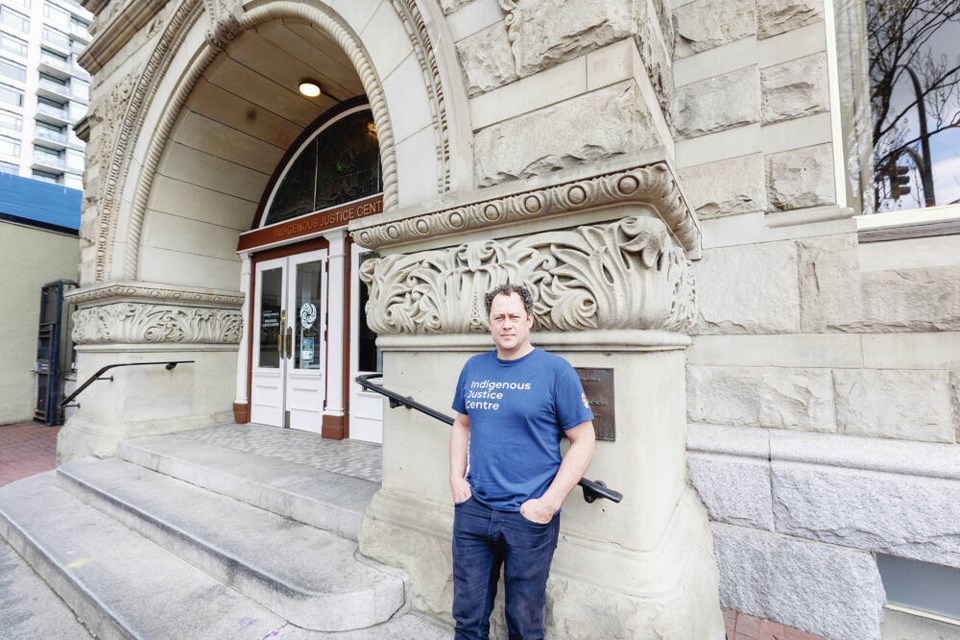Victoria’s former Carnegie library on Yates Street is getting a new lease on life as a hub where Indigenous people can get free legal support.
It’s one of two Indigenous Justice Centres that opened on Vancouver Island in January — the other is in Nanaimo — as part of a $44-million push by the B.C. government to support Indigenous people in criminal and child-protection matters.
Both centres are operated by the B.C. First Nations Justice Council, with Nanaimo’s centre located on Church Street in the Great National Land Building.
A total of 15 centres are expected to be open around the province by the end of this year.
During a recent media tour of the facility, two people who said they were Indigenous and homeless walked in asking for help. A staff member quickly provided them with a brochure that listed the centre’s supports.
Apart from legal services, Indigenous Justice Centres offer support workers who can connect clients with services such as housing, mental health and addictions care, as well as employment help.
While it’s located in a 1904 heritage building, inside the centre feels like a tech company, thanks to new sound-isolated, temperature-controlled office pods.
A spokesperson for the Justice Council said the pods, a legal-friendly solution that didn’t require construction permits, are the same type favoured by startups.
They’re used by lawyers who provide free legal advice and representation for people who have found themselves in criminal courts or dealing with child-protection matters. Together, the Victoria and Nanaimo centres employ about 16 lawyers.
The bank vault in the centre — 794 Yates once was home to a Westcoast Savings Credit Union branch — is now used to store office supplies.
A welcome message near the entrance is written in a dozen languages from various First Nations, Métis and Inuit groups, and there is plenty of local Indigenous artwork on display.
B.C. First Nations Justice Council CEO Amanda Carling said the establishment of the 15 justice centres means the organization will now be able to lay the groundwork for “radical reform” needed in B.C.’s justice and policing systems.
The council’s aim is to reduce the number of Indigenous people in the criminal justice system and children who are in the care of the state, she said.
Indigenous people make up under six per cent of the adult population but 35 per cent of the incarcerated population in B.C., according to B.C. Corrections.
Carling said while it might be an ambitious goal, she hopes to see traditional legal systems re-emerge from various First Nations that will have different ways of “fixing harm” in the next 10 years.
As an example, she pointed to the potlatch system — a once-banned ceremony that was not only an integral part of the gift-based economy for west coast First Nations but also a way to reduce inter-nation conflict and process hunting and fishing claims.
“Yes, colonial law will happen within the walls of the centre, but it’s the place where our staff will be the relationships and the legitimacy to move into [that],” said Carling, who is Red River Métis from Manitoba.
“Not every solution is going to work the same in every part of the province … the diversity of the Nations here is significant.”
Michael Jakeman, a clinical legal supervisor with the Justice Council, said the Victoria centre eventually hopes to bring on an elder-in-residence who will be able to welcome people, administer smudging ceremonies and provide cultural teachings for clients and staff.
Justice Council director Lydia Hwitsum, former chief of the Cowichan Tribes, said the centres represent a step toward addressing inequities and justice for Indigenous people.
“There’s a whole legal colonial framework of laws that have violated the human rights of First Nations people for generations,” said Hwitsum, who holds a law degree from the University of Victoria. “Imagine if your father was speaking their language, and the government made a law that said — actually, we can put you in jail for that.”
Founded in 2016 by the First Nations Leadership Council, the B.C. First Nations Justice Council currently supports 300 legal clients across B.C. The organization, which has recently grown to more than 100 employees, has provided Gladue reports in B.C. since 2021 for the sentencing of Indigenous offenders.
B.C. First Nations Justice Council directors with ties to Vancouver Island include Hwitsum, Kory Wilson (Puglid), a Kwakwaka’wakw lawyer and post-secondary education leader and Judith Sayers, president of the Nuu-chah-nulth Tribal Council.
>>> To comment on this article, write a letter to the editor: [email protected]



